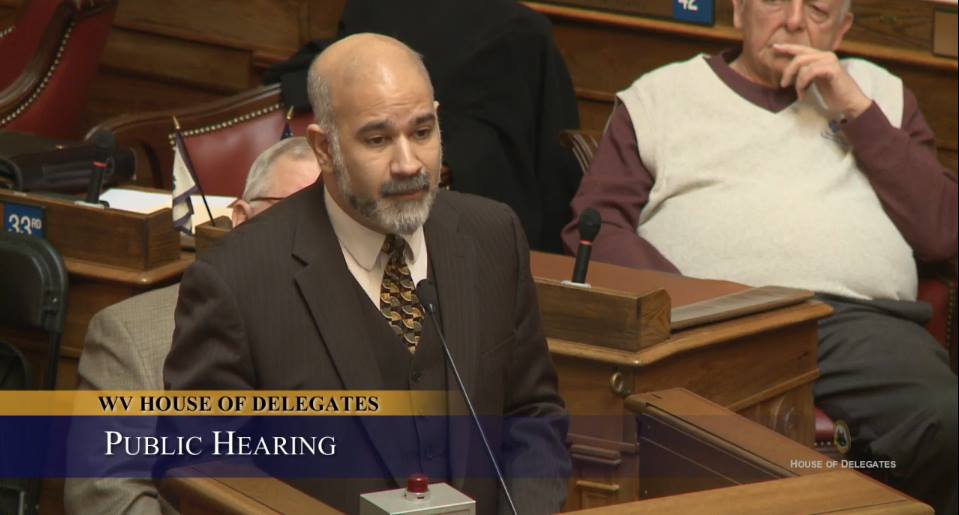Will Team Biden Weaponize Workers’ Pensions?
Big Labor abuse of worker pension and benefit funds as a means of advancing union bosses’ self-aggrandizing policy objectives is a familiar phenomenon.

Oral Testimony of Greg Mourad, National Right to Work Committee
West Virginia House of Delegates Judiciary Committee Hearing on S.B. 1, H.B. 2643 and H.B. 4006, Right to Work
January 28, 2016
My name is Greg Mourad. I am Vice President of the National Right to Work Committee, a 2.8 million member citizens’ organization dedicated to the elimination of compulsory unionism. On behalf of our members and of the tens of thousands of Right to Work supporters in West Virginia, I thank the chairman and members of this committee for taking the time today to examine the Right to Work issue, which would simply guarantee working men and women in West Virginia the right to decide for themselves whether a labor union deserves their financial support.
If you were to ask around, you would probably find that most people know Right to Work means more jobs and a better economy. Most people know that forcing anyone to bankroll an organization against their will just to keep their job is wrong. It’s also not hard to see how forced unionism can breed corruption and abuse.
But, because of their complexity, federal and state labor laws are not well understood by most citizens. I’d like to open my testimony with a simple illustration that highlights the principle upon which current national and West Virginia labor laws rest.
Imagine yourself standing just outside this building when a cab pulls up. Two guys grab you and pull you into the cab with them. When the driver announces that the cab is on its way to Wheeling, you protest, but the other two passengers tie you up and do not let you get out.
The driver ignores your protests.
After the lengthy drive, he finally pulls over. The car stops and they untie you. But before they let you go, the driver demands $100, “For the cab fare,” he explains.
“You’ve got to be kidding,” you say. “You forced me to go with you. I had nothing to say about it.”
“But you don’t understand,” they tell you. “We had a vote, and the majority rules. And unless you pay your share of the ride, you’re a ‘free rider.’ We have every right to make you pay.”
“But I didn’t want to go to Wheeling,” you say. “I’m a kidnap victim!”
In a nutshell, I have just illustrated how federal and state labor laws abuse the freedom of working people to earn an honest living for themselves and their families.
If this taxi ride were to happen for real, the other passengers and the driver of the taxi would be arrested for kidnapping and extortion. Forced unionism makes no more sense.
Under current law in West Virginia, employees who never requested union representation can be forced to accept a labor union as their exclusive monopoly bargaining agent and be forced to work within the union’s monopoly-negotiated contract. Then, compounding the injury, they can be forced to pay for representation they never requested and do not want.
You see, Big Labor’s whole intellectual house of cards is built on two myths that they desperately want you to believe. Neither myth is true.
Despite what you have heard and will continue to hear from West Virginia’s union officials, federal law does not require them to represent all workers.
Unions are perfectly free under federal law to negotiate a contract that only sets the terms and conditions for their own voluntary members.
Indeed, this practice was common in the first several years after the adoption of the National Labor Relations Act in 1935.
But a monopoly is a powerful thing.
That’s why, instead of exercising this perfectly legitimate members-only bargaining option, today’s union bosses consistently take advantage of the provisions of federal law that give them the tyrannical power to force every worker to submit to their monopoly bargaining — what the law euphemistically calls “exclusive representation.”
By exercising this power, they forbid individual workers from representing themselves.
Then these same union officials turn around and falsely complain that stripping away these workers’ right to self-representation has somehow become a “burden” to the union, entitling them to forced dues. This is among the most brazen hypocrisies you will ever find in American politics.
The other myth that Big Labor would like you to believe is that the union contract actually benefits all workers.
Nothing could be further from the truth.
Contracts that base pay entirely on seniority work against a new employee who would love to work harder, longer or smarter, and be rewarded for it. He cannot. And no matter how much better he works, he will be the first one fired.
Contracts that trade away wages in favor of gold-plated health insurance plans work to the advantage of older employees, and against young healthy employees who never visit doctors and would rather have a simple health plan and a couple extra dollars an hour.
Union contracts regularly hold back the most productive workers, and prominent pro-union theorists freely admit this fact.
Richard Rothstein, research associate of the union-backed Economic Policy Institute, commented that, “In [unionized] firms, wages of lower paid workers are raised above the market rate, with the increase offset . . . [in part] by reducing pay of the most productive workers.”
And Harvard economist Richard Freeman, one of the leading academic apologists for forced unionism, actually praised Big Labor for “removing performance judgments as a factor in determining individual workers’ pay.”
So don’t be fooled. Independent-minded workers are being forced to accept a union as their bargaining agent and are being forced to work under contracts that harm their interests.
It is an outrage to force people to pay for this so-called “representation” that they did not ask for, do not want and would be better off without.
Federal law that was supposedly constructed to “protect” workers actually contains some of the most deliberately misleading language one could imagine. Let me read the essential portion of Section 7 of the National Labor Relations Act, entitled “Rights of Employees”:
“Employees shall have the right to self-organization to form, join, or assist labor organizations, to bargain collectively through representatives of their own choosing, and to engage in other concerted activities for the purpose of collective bargaining or other mutual aid or protection, and shall also have the right to refrain from any or all such activities . . .”
Now, what could be fairer than that?
Unfortunately, the sentence does not end there. It continues:
Employees shall have the right to refrain “except to the extent that such right may be affected by an agreement requiring union membership as a condition of employment . . . .”
That “except,” and the words that follow, have to be one of the most cynical exercises in legislative deception on record.
Fortunately, since 1947, federal law has also allowed states the ability to partially right this wrong by passing a state Right to Work law.
That’s why we’re here today. I urge you to use this provision in federal law to protect the workers of the Mountain State by passing the West Virginia Right to Work Act.
The Right to Work Act would simply prohibit union officials from forcing employees to pay union dues in order to work.
The collection of forced dues is so odious that even the most avid promoters of compulsory unionism are forced to defend it on the basis of expediency, not principle.
No less an authority than Bill Clinton’s former Secretary of Labor, Robert Reich, put this most succinctly. As a Harvard lecturer in 1985, Reich gave the following explanation of federal labor law to an Associated Press reporter -– and I quote his exact words:
“In order to maintain themselves, unions have got to have some ability to strap their members to the mast.
“The only way unions can exercise countervailing power vis-à-vis management is to hold their members’ feet to the fire . . . . Otherwise, the organization is only as good as it is convenient for any given member at any given time.”
Secretary Reich has accurately –- if callously –- described the basic assumption of federal labor law –- that the convenience of union officials must take precedence over the freedom of employees who wish to earn a living for themselves and their families.
It’s a bad assumption, but that’s federal law, and there’s nothing you can do here in Charleston to change it.
But you do have the power to make the situation better with a Right to Work law, which would at least guarantee that workers need not pay to have their rights taken away.
The underlying philosophy of those who believe in the Right to Work principle can be best summed up by the words of Samuel Gompers, founder of the American Federation of Labor, who urged “devotion to the fundamentals of human liberty –- the principles of voluntarism. No lasting gain has ever come from compulsion. If we seek to force, we but tear apart that which, united, is invincible.”
Right to Work is about two things: freedom and jobs.
The people of West Virginia want a Right to Work law.
I implore the Committee to listen to them and the nearly 80 percent of all Americans who support giving all employees the Right to Work regardless of whether or not they pay union dues.
I ask the members of this committee to side with the majority of West Virginia citizens by voting down all amendments and sending the West Virginia Right to Work Act to the floor with your approval.

Big Labor abuse of worker pension and benefit funds as a means of advancing union bosses’ self-aggrandizing policy objectives is a familiar phenomenon.

What impact does handing a union monopoly power to deal with your employer on matters concerning your pay, benefits, and work rules have on your pay?

Facing state prosecution for violating City employee’s rights under 2018 Janus US Supreme Court ruling, IBEW stops dues seizure & issues refund to Chicago 911 operator